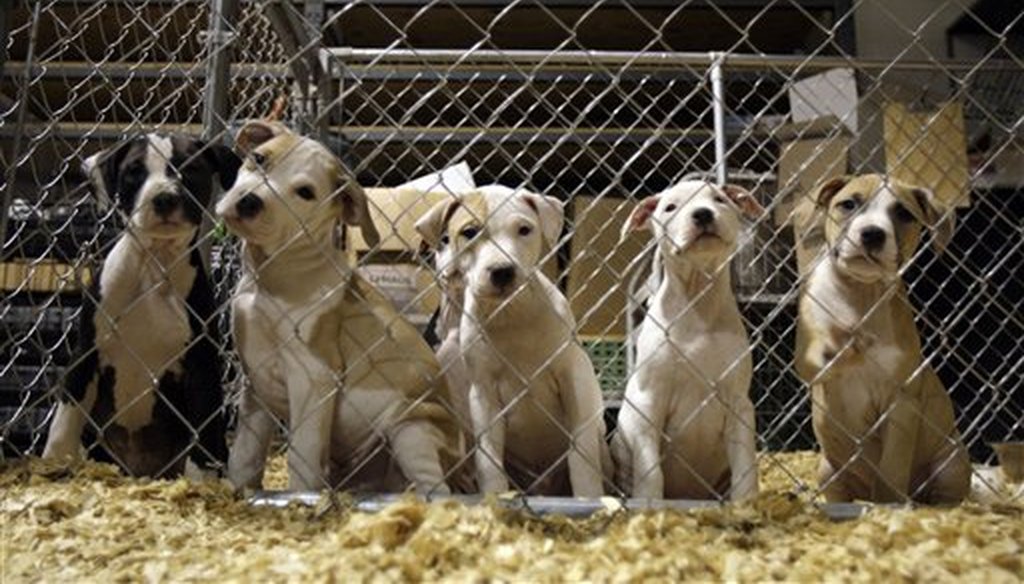Stand up for the facts!
Our only agenda is to publish the truth so you can be an informed participant in democracy.
We need your help.
I would like to contribute

Pit bull puppies are seen at an emergency shelter that housed hundreds of dogs seized in St. Louis as part of the largest dogfighting raid in U.S. history in 2009. (AP)
The Missouri legislature is considering a measure that would prevent governments from enacting bans against certain breeds of dogs across the entire state.
Breed specific legislation can be found across the United States, and are more commonly referred to as pit bull bans. These laws can ban the dogs outright, require owners to spay and neuter the dogs, or require owners to register the dogs. In Missouri there is no statewide breed specific legislation, but some cities have enacted their own ordinances concerning the dogs.
A proposed Missouri measure would ban breed specific legislation across the entire state. In the House Select Committee on General Laws hearing on Feb. 27, lobbyist Bob Baker from the Missouri Alliance for Animal Legislation opposed the bill. He reasoned that some cities, specifically Kansas City, need to be able to mandate that owners spay and neuter pit bulls as the breed is overpopulating shelters.
"Our shelters are full of pit bulls. Thirty to 50 percent of dogs in shelters are pit bulls," Baker said.
But do pit bulls really make up that much of the shelter population?
Baker told us his numbers came from looking at shelter websites and surveying dogs based on the photos that had been posted.
Randi Battson, animal services manager at the Sedalia Animal Shelter, said judging animal populations by shelter websites isn’t a reliable standard because pit bulls sit at shelters longer due to the aggressive stereotype around them.
"The rest of the breeds get adopted more quickly — sometimes so quickly that they never even make it to the webpages — and so that’s a very misleading way to measure how many come through a shelter versus other breeds," Battson said.
Veronica Chesse is the president and founder of Missouri Pitbull Rescue. She’s been working with the Kansas City pound for over 18 years. City animal shelters have to accept every dog brought to them, so Chesse’s organization takes in dogs to free up space there and give them a larger chance of being adopted. According to her, the Kansas City shelter is mostly full of pit bulls or pit bull type dogs. She had hoped that Kansas City’s mandatory spay and neuter law would reduce the shelter population, but in her experience that hasn’t been the case.
"I think they’re still completely overbred and very often owned by irresponsible people that are likely to mistreat them, abandon them, lose them and get them confiscated because they’re running free," Chesse said.
While Kansas City shelters may have a surplus of the breed, the same can’t be said for shelters statewide.
We talked to the animal shelters run by several cities, which are required to take in all breeds, to find out what percentage of pit bulls arrive in the shelters.
However, gathering accurate data on the number of pit bulls is difficult, since it’s often a challenge for shelters to properly categorize the dogs by breed.
Michelle Casey, the associate director of Columbia’s Central Missouri Humane Society, said her shelter is moving away from breed labeling and that many other shelters are doing the same thing. Without DNA testing, it’s impossible to accurately determine a dog’s genetic makeup based solely on appearance.
Pit bull isn’t really a breed; it is actually an umbrella term used to refer to several different breeds of dog. Merriam-Webster characterizes a pit bull as "a muscular, short-haired, stocky dog (such as an American pit bull terrier or American Staffordshire terrier) of any of several breeds or a hybrid with one or more of these breeds that was originally developed for fighting and is noted for strength, stamina, and tenacity." American Pit Bull Terriers, American Staffordshire Terriers, Bull Terriers and Staffordshire Bull Terriers all fall under the umbrella term. Mixed breed dogs that have American Bulldog or Boxer lineage are also sometimes mischaracterized as pit bulls due to their blocky heads.
The shelters shared their data, but because it’s difficult to categorize the dogs, Casey made sure to clarify to us that even the data provided by the shelters needs to be taken with a grain of salt.
The Joplin animal shelter took in 3,429 dogs in 2018. Of these, 444 were recorded as pit bulls, making pit bulls 13 percent of the shelter population. The Sedalia animal shelter took in 992 dogs in 2018 — 204 of which were labeled as pit bulls — 21 percent of dogs.
Columbia took in 1,546 dogs and recorded 356 of these as pit bull type dogs, or 23 percent. This number doesn’t include dogs who have pit bull listed as a secondary breed.
Baker said 30 to 50 percent of dogs in shelters are pit bulls. He told us he was going by animal shelter webpages he has seen. Shelters say that is not an accurate way to gauge the percentage of pit bulls compared to other dogs in a shelter, because some dog breeds are adopted more quickly and never appear on websites. In addition, it is also difficult to obtain an accurate percentage as pit bull is an umbrella term that encompasses dogs of a certain body type rather than a specific breed.
Our research found that city shelters around the state are seeing 15 to 20 percent of shelter dogs as pit bulls, but it is challenging to define which dogs are pit bulls because the definition is broad. We decided not to rate this statement, as the data available to us is too weak for a definitive ruling.
Our Sources
Email exchange with Michelle Casey, the associate director of Columbia’s Central Missouri Humane Society, April 18
Interview with Veronica Chesse, president and founder of Missouri Pitbull Rescue, March 21
Interview with Randi Battson, animal services manager at the Sedalia Animal Shelter, March 21
Phone call with Joplin Animal Shelter, April 24
Merriam-Webster, definition of a pit bull















